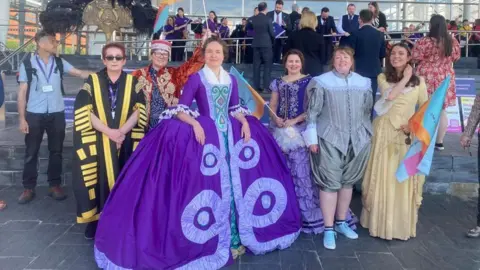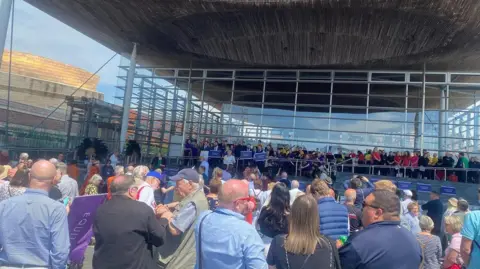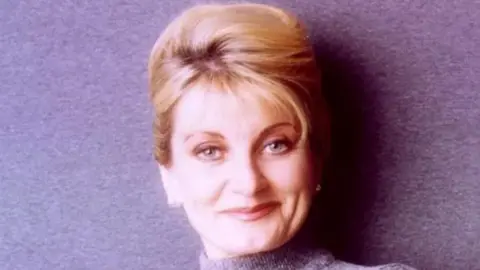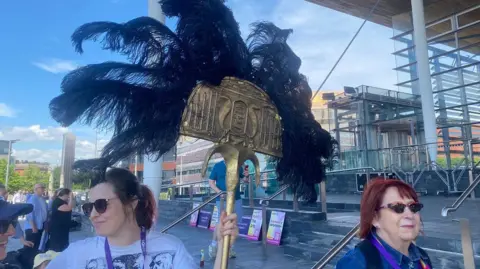Catherine Evans,Lorna Prichard
 BBC
BBCAn opera singer has said she was forced to quit professional singing and become a care worker.
Mezzo soprano Leah Marian Jones spoke to BBC Radio Cymru as hundreds of people joined members of the Welsh National Opera (WNO) chorus and orchestra at the Senedd in protest over funding cuts.
Arts Council England (ACE) has cut the WNO’s funding by 35%, while Arts Council of Wales (ACW) reduced its funding by 11.8%.
A WNO spokesperson said they “have had to make changes to ensure that Welsh National Opera remains financially sustainable in the future”.
Performances will be cut next year due to the funding cuts, it said.
Minister for Culture and Social Justice Lesley Griffiths said she regretted every budget cut, but added: “We have a small amount of money that we have to make sure gets round to everybody.”

Conducted by Carlo Rizzi, the protest started with a version of Easter Hymn from Cavaleria Rusticani, the first opera to be staged by the company in 1946.
After a selection from Bizet’s Carmen, community choirs joined in for Welsh hymn Gwahoddiad and the national anthem.
Organiser Elizabeth Atherton said she hoped the singing was loud enough to disrupt proceedings “so they know what is in danger of being lost”.
She said: “We are literally singing for our future.”
Super Furry Animals frontman Gruff Rhys, who has previously worked with the “incredible” orchestra, took to social media to say he found it “very difficult to watch the latest episode of the cultural crisis”.
He added it was “sad to think that this valuable resource will not be available to others in the future”.
A protest letter, signed by the likes of Sir Bryn Terfel, Katherine Jenkins, Michael Sheen and Ruth Jones, has also been sent to First Minister Vaughan Gething.
It warns that WNO is “being forced to make its orchestra and chorus part-time”.
It also calls the “potential dismantling of one of Wales’ finest national institutions devastating for the nation”.
 Leah Marian Jones
Leah Marian JonesLeah Marian Jones, who has appeared on major world opera stages as well as singing with the WNO, said there was not enough work for her.
Ms Jones told BBC Radio Cymru’s Dros Frecwast: “I’m a carer for old people. I get them up in the morning, take them to the toilet and dress them and feed them.”
Even the youngest singers, who generally cost less to employ, are unable to get work, she said.
She asked if there is any point in teaching people, if there is no job for them to go to?
A Welsh National Opera spokesperson said they “have to take further steps in order to make savings”.
They added that, as well as reducing performances, they “have opened a voluntary redundancy window for our colleagues who perform non-performing roles, and we are in discussions with unions about renegotiating contracts with our orchestra and chorus to save costs”.
“Every effort is being made to support colleagues through what we know is a difficult process, but unfortunately an inevitable one due to our financial situation and the savings we need to make,” it added.

According to Philip Lloyd-Evans of the Welsh Opera chorus, the cuts “are going to have a huge impact on the company going forward”.
“These chaotic cuts mean that neither your chorus nor your orchestra can operate full-time,” he said.
“The communities we reach will be smaller, the audiences we perform in front of will be smaller and the future of making music for our children will be much smaller.”
Minister for Culture and Social Justice Lesley Griffiths said: “I regret every cut we have for the budget.
“I didn’t go into politics to make budget cuts. But the reality is we’ve had 14 years of austerity and we’ve had one thing after the other.
“We’ve had the Covid pandemic, Brexit, we’ve got the cost of living crisis and it’s about making sure we use our money to the very best of our ability.”

